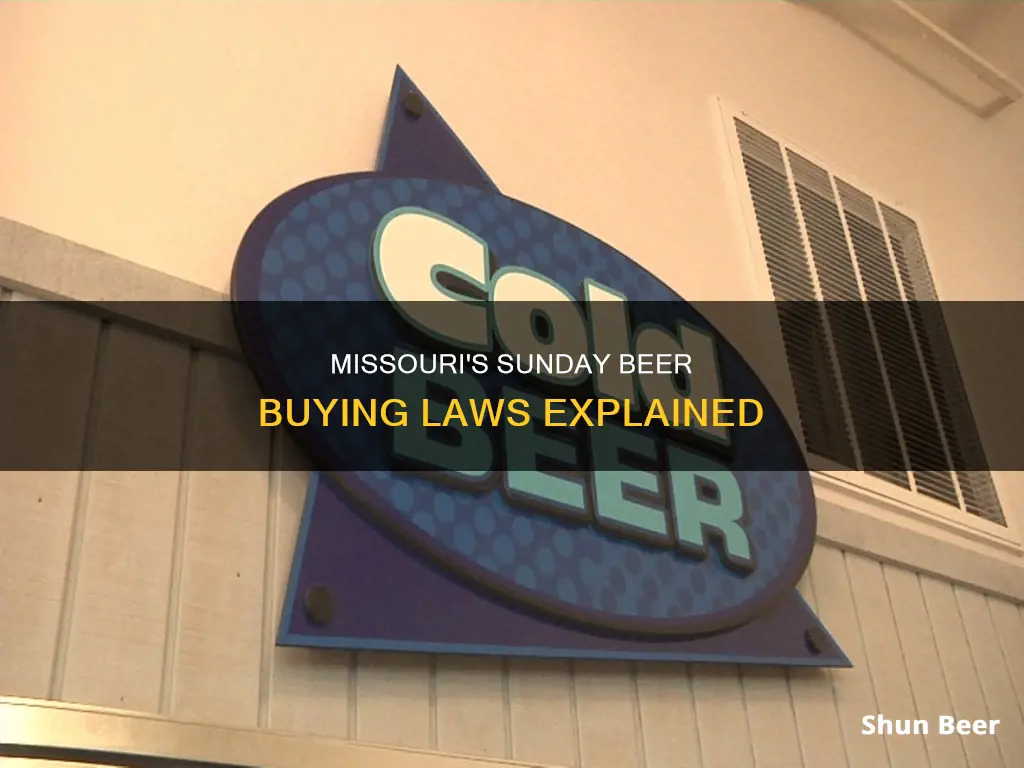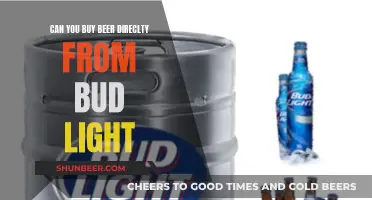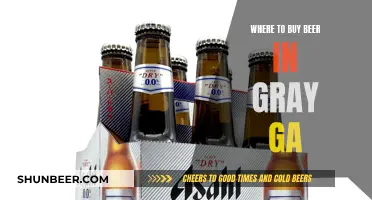
Missouri has some of the most permissive alcohol laws in the United States. The state has a largely laissez-faire approach to alcohol regulation, with no dry jurisdictions. Missouri's alcohol laws have generally always been this way, even during the height of the temperance movement in the late 19th and early 20th centuries. While Missouri did prohibit Sunday liquor sales in 1934, this restriction was lifted in 1975. In 2021, the state further loosened its alcohol laws, allowing alcohol sales from 6 a.m. to 1:30 a.m. on Sundays, aligning with the hours for the rest of the week.
| Characteristics | Values |
|---|---|
| Alcohol sales on Sunday | Yes |
| Sunday hours for on- and off-premise purchases | 6 a.m. to 1:30 a.m. |
| Sunday liquor hours by the drink | Same as other days of the week |
| Sunday liquor sales for off-premise consumption | 6 a.m. Sunday to 1:30 a.m. Monday |
| Sunday by-the-drink licenses in convention trade areas | 6 a.m. for consumption at convention trade areas in Kansas City, North Kansas City, Jackson County, St. Louis County, and St. Louis |
| Additional license required for Sunday sales? | Yes |
What You'll Learn
- Missouri's alcohol laws are among the most permissive in the US
- Missouri's alcohol laws are largely dictated by its position as the leading alcohol-producing state in America
- Missouri's history of alcohol laws, including the temperance movement and Prohibition
- Missouri's three-tier distribution system for alcohol
- Missouri's alcohol sales on Sundays, including the hours of sale and the additional license required

Missouri's alcohol laws are among the most permissive in the US
During the temperance movement of the late 19th and early 20th centuries, Missouri never implemented its own statewide prohibition. In fact, voters in Missouri rejected prohibition in three separate initiative elections in 1910, 1912, and 1918. When temperance crusader Carrie A. Nation entered a bar in Kansas City in 1901 and began smashing liquor bottles, she was promptly arrested and fined $500, which was waived on the condition that she agreed to leave Missouri and never return.
In 1934, Missouri enacted its first Liquor Control Law, which repealed local laws and gave the state control over liquor regulation for the first time. Today, Missouri has no dry jurisdictions, and its alcohol regime is considered one of the least restrictive in the US, with no blue laws and taxes below the national average.
Missouri's Liquor Control Law covers any beverage containing more than 0.5% alcohol by volume, and the state does not differentiate between types of alcohol based on alcohol percentage. Any business with the proper licenses can sell alcohol "off-premises", and the state even forbids local governments from banning off-premises alcohol sales. Missouri also has no specific state law prohibiting drinking in public, and it is one of only six states with no state public intoxication law.
In recent years, Missouri has further relaxed its alcohol laws. During the COVID-19 pandemic, the state temporarily allowed the sale of to-go cocktails to help bars and restaurants, and this law became permanent in August 2021. Additionally, Missouri lifted its restrictions on Sunday alcohol sales, allowing businesses to sell alcohol from 6 am to 1:30 am on Sundays, aligning with the hours for the rest of the week.
The Best Places to Buy Chinese Beer
You may want to see also

Missouri's alcohol laws are largely dictated by its position as the leading alcohol-producing state in America
Missouri's permissive alcohol laws are rooted in its history as a leading alcohol producer. The state is well-known for its wine production in the Missouri Rhineland and beer production in St. Louis by Anheuser-Busch, the world's largest beer producer, which manufactures Budweiser. Anheuser-Busch has been the principal advocate for keeping Missouri's alcohol laws lax.
During the height of the temperance movement in the late 19th and early 20th centuries, Missouri never implemented statewide prohibition. Voters in the state rejected prohibition in three separate initiative elections in 1910, 1912, and 1918. When a temperance crusader entered a bar in Kansas City in 1901 and began smashing liquor bottles, she was promptly arrested and fined.
An 1857 Missouri statute left liquor regulation to localities, and by the end of nationwide prohibition in 1934, half of Missouri's counties had gone dry. However, the state soon enacted its first Liquor Control Law, which established statewide control of liquor for the first time. Today, Missouri has no dry jurisdictions.
Missouri's original 1934 Liquor Control Law prohibited Sunday sales of beverages with more than 5% alcohol by volume, but this restriction was lifted in 1975. In 2021, Missouri further relaxed its alcohol laws by allowing Sunday sales of alcohol from 6 am to 1:30 am, aligning with the hours for the rest of the week.
Missouri's alcohol laws stand out for their lack of differentiation based on alcohol percentage. The state's Liquor Control Law covers any alcoholic beverage containing more than 0.5% alcohol by volume. Additionally, Missouri has no open container laws for vehicles, no state public intoxication laws, and no state law prohibiting drinking in public.
Missouri's alcohol laws are influenced by its position as a leading alcohol producer, resulting in a permissive regulatory environment that contrasts with neighbouring states. The state's history, culture, and economic interests have shaped its approach to alcohol regulation, contributing to its reputation as one of the most permissive states in the US when it comes to alcohol laws.
Buying Beer in Oregon: Early Morning Purchases Explained
You may want to see also

Missouri's history of alcohol laws, including the temperance movement and Prohibition
Missouri's alcohol laws are among the most permissive in the United States. The state has a laissez-faire approach to alcohol regulation, which is in stark contrast to its neighbours, such as Kansas and Oklahoma. This tendency has always been evident in Missouri's alcohol laws, perhaps due to its position as the leading alcohol-producing state in America. Missouri is well known for its wine production in the Missouri Rhineland and its beer production in St. Louis by Anheuser-Busch, which produces Budweiser.
During the height of the temperance movement in the late 19th and early 20th centuries, Missouri never implemented its own statewide prohibition. In fact, voters rejected prohibition in three separate initiative elections in 1910, 1912, and 1918. When temperance crusader Carrie A. Nation entered a bar in Kansas City in 1901 and began smashing liquor bottles with her hatchet, she was promptly arrested and fined $500. The Missouri General Assembly did ratify the 18th Amendment in 1919, but only after it had already received enough ratifications to become part of the Constitution.
During Prohibition, political boss Tom Pendergast ensured that the national prohibition law would not affect Kansas City's liquor industry and saloons. Kansas City's federal prosecutor, who was on Pendergast's payroll, never brought a single felony prosecution under the Volstead Act. This led to an atmosphere of lawlessness in the city, with bootlegged alcohol provided by Al Capone and Kansas City becoming known as a "wide-open" 24-hour town.
An 1857 Missouri statute left all liquor regulation to localities, including the question of prohibition. Despite the lack of statewide prohibition, by the end of nationwide prohibition in 1934, half of Missouri's counties had gone dry. Immediately, Missouri enacted its first Liquor Control Law, which repealed and superseded the local laws. This was the first time Missouri had any statewide control of liquor.
Temperance Movement
The Temperance Movement of the 19th century was principally led by women who protested against alcohol abuse and how it caused men to commit domestic violence. The movement combined a concern for social ills with religious sentiment and practical health considerations, appealing to many middle-class reformers. The earliest temperance reformers were concerned with the overindulgence of American drinkers and encouraged moderation. By 1830, the average American over 15 consumed at least seven gallons of alcohol a year. It was argued that alcohol abuse led to poverty and domestic violence.
The Women's Christian Temperance Union (WCTU) was founded in 1873 and became a national social reform and lobbying organisation the following year. Its second president, Frances Willard, helped grow the WCTU into the largest women's religious organisation in the 19th century. Willard was concerned with temperance, as well as women's rights, suffrage, and international social justice. She saw alcoholics as mentally weak and unstable and believed that temperance could improve the quality of life for alcoholics and their families and communities.
Prohibition
Prohibition was brought about by the 18th Amendment to the Constitution, which prohibited the manufacturing, transportation, and sale of alcohol. It took effect in January 1920. The new amendment forced the shutdown of nearly all wineries and breweries, and even vineyards were uprooted.
Prohibition lasted until the ratification of the 21st Amendment in 1933. During this time, Congress granted each state the primary responsibility and control of the importation, transportation, distribution, and sale of alcoholic beverages within their borders. This was done to prevent a return to the abuses associated with the distribution and sale of alcohol prior to Prohibition. The states established comprehensive liquor control systems to regulate the channels of distribution of alcoholic beverages, from the time the product reaches the state's border until it reaches the consumer.
Legal Drinking Age: Beer Buying Restrictions and Limits
You may want to see also

Missouri's three-tier distribution system for alcohol
In Missouri, all facets of the sale of alcohol must follow the three-tier model. This means that every producer and seller of alcoholic beverages must work with a "middle-tier" company, which is usually a private company but can be a government agency in some states. Wholesalers and/or importers are referred to as the "middle tier". They advertise and sell products to retailers after purchasing them from suppliers.
Missouri's alcohol laws are among the most permissive in the United States, with a largely laissez-faire approach to regulation. Missouri has no dry jurisdictions and is famous for grocery stores, drug stores, and gas stations that sell a wide variety of alcoholic beverages. The state has no specific limitations on the places where alcohol can be sold "off-premises" (i.e. for consumption elsewhere). As long as it is not within 100 feet of a school or church, virtually any retail business that obtains the proper licenses may sell alcohol.
Until recently, Missouri had a separate regulation for beer containing at least 0.5% alcohol by volume and at most 3.2% alcohol by weight, which was classified as "nonintoxicating beer" and subject to a separate law from the Liquor Control Law. However, this regulation was rarely invoked, and in August 2009, it was repealed by the Missouri General Assembly. Now, the Liquor Control Law controls all alcoholic beverages containing more than 0.5% alcohol by volume.
The state's drinking age has been 21 since 1945, and it is a misdemeanor for a minor to possess or purchase alcohol. However, Missouri is one of six states with an exception that allows minors to be furnished alcohol by their parents or guardians.
In terms of purchasing alcohol on Sundays, a new law approved by the Legislature in the spring of 2024 allows businesses to sell alcoholic beverages from 6 am to 1:30 am on Sundays, aligning the day with the hours in place for sales during the rest of the week. This law took effect on August 28, 2024.
Best Places to Buy Beer Funnels
You may want to see also

Missouri's alcohol sales on Sundays, including the hours of sale and the additional license required
Missouri's alcohol laws are among the most permissive in the United States, with a largely laissez-faire approach to alcohol regulation. The state's liquor laws are controlled by the Missouri Division of Alcohol and Tobacco Control (ATC).
Sunday Alcohol Sales Hours
On Sundays, alcohol can be sold from 6 a.m. to 1:30 a.m. the following day, aligning with the hours of sale for the rest of the week. This change came into effect on August 28, 2021, lifting the previous restriction that prohibited Sunday sales before 9 a.m. and after midnight.
Additional License for Sunday Sales
Businesses wishing to sell alcohol on Sundays must apply for an additional license. This license permits the sale of alcohol on Sundays from 1:30 a.m. to 6:30 a.m., in addition to the standard Sunday sales hours.
Other Alcohol Sales Regulations
Missouri has a three-tier distribution system, including the manufacturer, distributor, and retailer. Each level requires a license to sell alcohol. The state also regulates how alcohol is marketed and consumed, with laws prohibiting the sale of alcohol to minors and restricting the locations where alcohol can be sold, such as within 100 feet of a school or church.
Buying Beer at College Football Games: What's the Deal?
You may want to see also
Frequently asked questions
Yes, you can buy beer in Missouri on Sunday.
Beer can be sold from 6 a.m. on Sunday through 1:30 a.m. on Monday.
Yes, an additional license is required to sell beer on Sundays in Missouri.
Alcohol can be sold within 100 feet of a school or church if written approval is obtained from the city's board of aldermen, city council, or other proper authorities.







